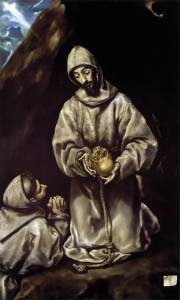Last night was a bit sad for me because it was the last session of my Desert Fathers course for Davenant Hall — “Streams in the Desert: The Christian Wisdom of the Desert Fathers.” We closed with Sts Barsanuphius and John, a pair of monastic fathers in sixth-century Gaza who left behind a corpus of 850 letters of spiritual instruction. Letter 170:
Question from the same brother to the Other Old Man [John rather than B.]. If a fantasy occurs to me by night and, on the next day, there is Holy Communion, what should I do?
Response by John
Let us approach with all our wounds and not with any contempt, as people who are needful of a doctor, and he who healed the woman with the issue of blood (Mt 9.22) will also heal us. Let us love much, that he may also say to us: “Your many sins are forgiven; for you have loved much” (Lk 7.47). When you are about to take Communion, say: “Master, do not allow these holy things to be unto my condemnation but unto purification of soul and body and spirit.” Then, you may approach with fear, and our Master, who is loving-kind, will work his mercy with us. Amen.
Trans. John Chryssavgis, Letters from the Desert (SVS Press 2003), p. 93.
There’s a lot that could be unpacked from this letter from the Other Old Man, about grace and trusting in God and loving God and so forth. What I want to point out is the Holy Communion. As I said on the first episode of my and my brother Jonathan’s podcast, the Holy Communion is paradigmatic for the entire devotional life. And so in Ep. 170 of Barsanuphius and John it is likewise: It is about approaching, doing what you are able, and trusting in God to be merciful even when we are weak.
It is about the coming of grace.
Holy Communion is not often talked about in relation to the Desert Fathers. Usually, and understandably, we talk about their teachings on topics such as interior prayer, fasting, Psalmody, watchfulness, apatheia, hesychia, etc. In the selection of letters in this volume of Chryssavgis’ (who has also translated them all in two volumes for The Fathers of the Church series), Holy Communion comes up in five letters, to both communicants and celebrants. Ep. 241 is a beauty; I’ll quote only a bit:
The deacon serves like the Cherubim, and ought to be all eye, all intellect, with his intellect and thought looking upward, with fear, trembling, and doxology. For he bears the Body and Blood of the immortal King. He even assumes the face of the Seraphim in proclaiming the doxology and in fanning the hidden mysteries as with their holy wings, recalling through these wings their levitation from this earth and from things material, crying out ceaselessly with his intellect in the temple of the inner man (cf. Rom 7.22) the victory hymn of the magnificent glory (cf. 2 Pet 1.17) of our God: “Holy, holy, holy, Lord God of Sabaoth; heaven and earth are full of your glory” (Is 6.3).
Trans. Chryssavgis, p. 107
The angelic allegory continues — this is what is recommended to someone serving at the altar in the role of deacon during the Divine Liturgy is meant to meditate upon. The liturgy is not just something we are doing here on earth — we join the host of heaven as we offer up the sacrifice of praise and thanksgiving. The angels, archangels, and all the company of heaven are worshipping with us. It is a deeply spiritual, powerful, mystical event, and God is present there to us and with us through the Holy Communion.
The desert tradition of spirituality is not, then, divorced from the common worship of the church in all ages. Now, it’s true that St Mary of Egypt went 40 years in complete solitude and thus didn’t received communion. And many of the hermits only received occasionally. But it’s also true that, say, St Simeon the Stylite went for an extended period living on nothing but Holy Communion! When the semi-eremetic communities emerged at Nitria, Kellia, and Sketis, the abbas of the desert all lived within walking distance of a common chapel. Even if they were hermits six days a week, the Desert Fathers, for the most part, got together for the assembly of the saints, the synaxis, and this was a service of Holy Communion.
They received communion at least weekly, and they believed in the Real Presence of Christ, as we see in the Sayings as well as in the discourses of St Shenoute of Atripe. The Sayings include a miracle story wherein one simple monk who doubted the veracity of the body and blood under the species of bread and wine had a vision of the priest offering him bloody flesh at Communion, and so came to believe in the Real Presence. And Shenoute is insistent about the reality of the bread as Christ’s body, sounding in many ways like St Cyril of Alexandria, with whom St Shenoute had contact.
They practised Holy Communion. They believed as did other Christians of the era both that it was truly the body and blood of our Lord and that it was a means of grace.
So, hopefully, this Sunday you will be able to engage in another aspect of Desert spirituality at your local parish church. And, like St Barsanuphius’ companion, remember that the angels and archangels, cherubim and seraphim, thrones, dominions, and powers are there, too, worshipping God with us.







